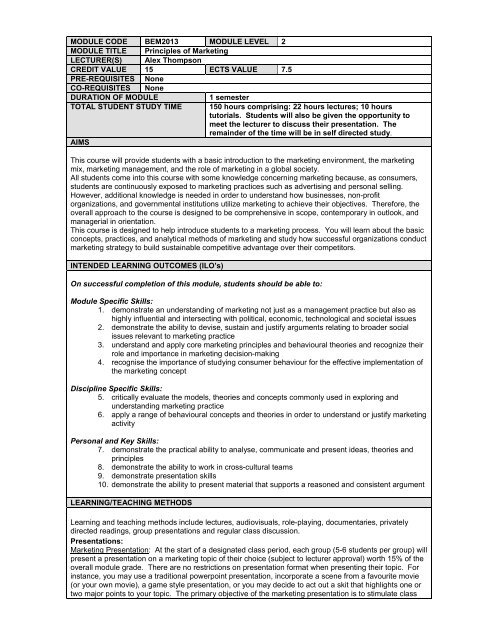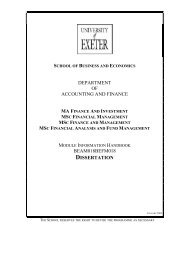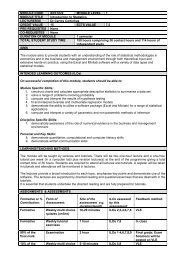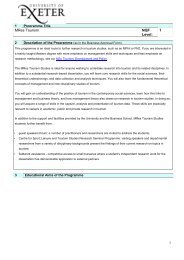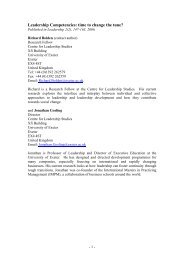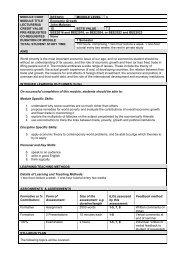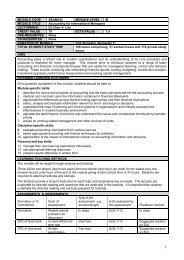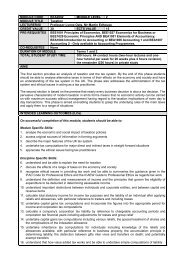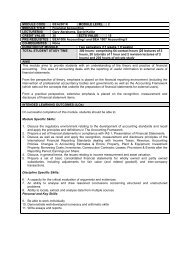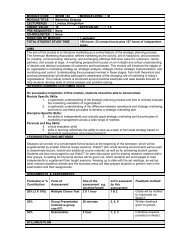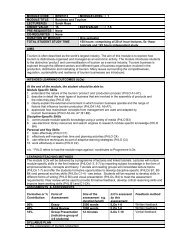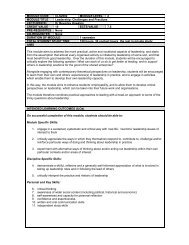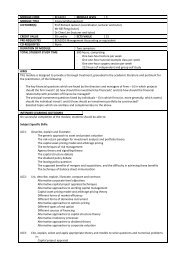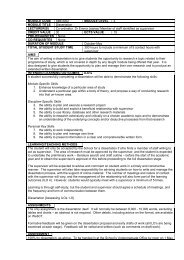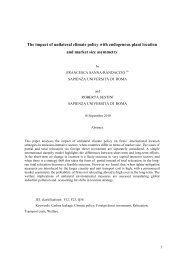MODULE CODE BEM2013 MODULE LEVEL 2 MODULE TITLE ...
MODULE CODE BEM2013 MODULE LEVEL 2 MODULE TITLE ...
MODULE CODE BEM2013 MODULE LEVEL 2 MODULE TITLE ...
You also want an ePaper? Increase the reach of your titles
YUMPU automatically turns print PDFs into web optimized ePapers that Google loves.
<strong>MODULE</strong> <strong>CODE</strong> <strong>BEM2013</strong> <strong>MODULE</strong> <strong>LEVEL</strong> 2<br />
<strong>MODULE</strong> <strong>TITLE</strong> Principles of Marketing<br />
LECTURER(S) Alex Thompson<br />
CREDIT VALUE 15 ECTS VALUE 7.5<br />
PRE-REQUISITES None<br />
CO-REQUISITES None<br />
DURATION OF <strong>MODULE</strong> 1 semester<br />
TOTAL STUDENT STUDY TIME 150 hours comprising: 22 hours lectures; 10 hours<br />
tutorials. Students will also be given the opportunity to<br />
meet the lecturer to discuss their presentation. The<br />
remainder of the time will be in self directed study.<br />
AIMS<br />
This course will provide students with a basic introduction to the marketing environment, the marketing<br />
mix, marketing management, and the role of marketing in a global society.<br />
All students come into this course with some knowledge concerning marketing because, as consumers,<br />
students are continuously exposed to marketing practices such as advertising and personal selling.<br />
However, additional knowledge is needed in order to understand how businesses, non-profit<br />
organizations, and governmental institutions utilize marketing to achieve their objectives. Therefore, the<br />
overall approach to the course is designed to be comprehensive in scope, contemporary in outlook, and<br />
managerial in orientation.<br />
This course is designed to help introduce students to a marketing process. You will learn about the basic<br />
concepts, practices, and analytical methods of marketing and study how successful organizations conduct<br />
marketing strategy to build sustainable competitive advantage over their competitors.<br />
INTENDED LEARNING OUTCOMES (ILO’s)<br />
On successful completion of this module, students should be able to:<br />
Module Specific Skills:<br />
1. demonstrate an understanding of marketing not just as a management practice but also as<br />
highly influential and intersecting with political, economic, technological and societal issues<br />
2. demonstrate the ability to devise, sustain and justify arguments relating to broader social<br />
issues relevant to marketing practice<br />
3. understand and apply core marketing principles and behavioural theories and recognize their<br />
role and importance in marketing decision-making<br />
4. recognise the importance of studying consumer behaviour for the effective implementation of<br />
the marketing concept<br />
Discipline Specific Skills:<br />
5. critically evaluate the models, theories and concepts commonly used in exploring and<br />
understanding marketing practice<br />
6. apply a range of behavioural concepts and theories in order to understand or justify marketing<br />
activity<br />
Personal and Key Skills:<br />
7. demonstrate the practical ability to analyse, communicate and present ideas, theories and<br />
principles<br />
8. demonstrate the ability to work in cross-cultural teams<br />
9. demonstrate presentation skills<br />
10. demonstrate the ability to present material that supports a reasoned and consistent argument<br />
LEARNING/TEACHING METHODS<br />
Learning and teaching methods include lectures, audiovisuals, role-playing, documentaries, privately<br />
directed readings, group presentations and regular class discussion.<br />
Presentations:<br />
Marketing Presentation: At the start of a designated class period, each group (5-6 students per group) will<br />
present a presentation on a marketing topic of their choice (subject to lecturer approval) worth 15% of the<br />
overall module grade. There are no restrictions on presentation format when presenting their topic. For<br />
instance, you may use a traditional powerpoint presentation, incorporate a scene from a favourite movie<br />
(or your own movie), a game style presentation, or you may decide to act out a skit that highlights one or<br />
two major points to your topic. The primary objective of the marketing presentation is to stimulate class
interest in the lecture material and demonstrate conceptual understanding of your chosen material.<br />
Effective marketing presentations often incorporate personal experience/ opinions of the main point(s) of<br />
your topic rather than a point-by-point summary.<br />
The Lecturer will recommend potential marketing topics that can be used for a presentation and topics will<br />
be made available in class. Presentations will be assigned on a first come, first serve basis. If students<br />
choose their own topic, this must be approved with the Lecturer in advance of their scheduled<br />
presentation date. Each group is responsible for ensuring their presentation is ready on the day their<br />
group is assigned to present.<br />
Individual Assignment:<br />
Each student will submit one individual written paper covering their chosen presentation topic worth 15%<br />
of the overall course grade. Papers will consist of an overview of the presentation topic and should<br />
incorporate the relevant marketing concepts covered in class and pertinent to the topic at hand. Papers<br />
should be typewritten, 1.5 spaced and approximately 1,000 words (3-4 pages).<br />
Examination:<br />
There will be one final examination (70%) covering the core concepts within our Principles and Practice of<br />
Marketing textbook as well as concepts covered within the lectures. The final examination will consist of<br />
multiple-choice questions as well as short answer/ essay questions.<br />
ASSIGNMENTS & ASSESSMENTS<br />
Formative or %<br />
Contribution:<br />
Form of<br />
Assessment:<br />
Size of the<br />
assessment e.g.<br />
duration/length<br />
ILO’s assessed<br />
by this<br />
assessment:<br />
Feedback method:<br />
15% of final In–class group 10-15mins ILOs 7-10 Written Feedback<br />
mark<br />
presentation<br />
15% of final One individual 1,000 words ILOs 5-7 Performance<br />
mark<br />
written assignment<br />
covering<br />
presentation topic.<br />
Summary<br />
70% of final Examination 3 hours ILOs 1-4 Performance<br />
mark<br />
Summary<br />
SYLLABUS PLAN<br />
The following subjects will be taught throughout the course of the term:<br />
• What is Marketing?<br />
• The Marketing Environment<br />
• Consumer Behaviour<br />
• Segmentation Targeting & Positioning<br />
• Marketing Research<br />
• Product Classifications<br />
• Pricing Decisions<br />
• Supply Chain Management<br />
• Integrated Marketing Communications<br />
• Promotion and Personal Selling<br />
• Services<br />
• There will also be a number of short topical presentations on issues pertinent to marketing<br />
INDICATIVE LEARNING RESOURCES<br />
Indicative basic reading list:<br />
Blythe, Jim (2009) Principles & Practice of Marketing 2 nd Edition. (location) Thomson Publishing ISBN:<br />
9781408011478<br />
DATE OF LAST REVISION July 2009 AT


